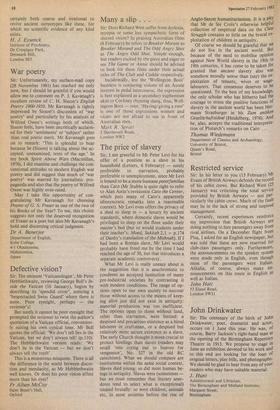The price of slavery
Sir: I am grateful to Mr Peter Levi for his offer of a position as a slave in his household (Letters, 6 February) — surely preferable to starvation, probably preferable to unemployment, since Mr Levi is bound to be a more humane paterfamilias than Cato (Mr Stubbs is quite right to refer to Alan Astin's revisionist Cato the Censor, which puts many of Cato's apparently idiosyncratic remarks into a reasonable context). Mr Levi even offers the privacy of a shed to sleep in — a luxury by ancient standards, where domestic slaves would be privileged to sleep on the floor under their master's bed (but so would students under their teacher's: Moed, Sukkah 2,1 = p.174 of Danby's translation of the Mishnah). If I had been a Roman slave, Mr Levi would probably have freed me by the time I had reached the age of 30, but that introduces a separate academic controversy.
What Mr Levi is really uneasy about is the suggestion that it is anachronistic to condemn an accepted institution of many pre-industrial societies by contrasting it with modern conditions. The range of op- tions open to our own society to succour those without access to the means of keep- ing alive just did not exist in antiquity: material production was too inefficient. The options open to those without land, other than starvation, were limited: a despised and precarious existence as a hired labourer or craftsman, or a despised but relatively more secure existence as a slave. The early Church thought it more crucial to protect hirelings than slaves (readers may recall 'sins crying out to heaven for vengeance', No. 327 in the old RC catechism). What we should compare are institutions within the same social context. Slaves died young: so did most human be- ings in antiquity. Slaves were (sometimes but we must remember that literary anec- dotes tend to select what is exceptional) treated brutally: so were children, animals etc, in most societies before the rise of
Anglo-Saxon humanitarianism. It is a pity that Mr de Ste Croix's otherwise helpful collection of empirical data on the Class Struggle contains so little on the brutal ex- ploitation of children in antiquity. Of course we should be grateful that we do not live in the ancient world. But because of the need to mobilise opinion against New World slavery in the 18th to 19th centuries, it has come to be taken for granted that ancient slavery also was somehow morally worse than (say) the ex- ploitation of tenants, wives or wage- labourers. That consensus deserves to be questioned. To the best of my knowledge, the only scholar who has hitherto had the courage to stress the positive functions of slavery in the ancient world has been Her- mann Strasburger in his Zum antiken Gesellschaftsideal (Heidelberg, 1976). And he, alas, accepts the traditional interpreta- tion of Plutarch's remarks on Cato ...
Thomas Wiedemann
Department of Classics and Archaeology, University of Bristol, Queen's Road, Bristol




































 Previous page
Previous page